- Home
- Marge Piercy
Vida Page 3
Vida Read online
Page 3
The rain still insinuated from the air, a fine clinging drizzle with a salt tang. None of the cars suggested a stakeout to her. She did not sense anything amiss. Slowly she walked into the dim interior, letting her eyes accustom to the bluish light from the diamond-paned windows with their red escutcheons before she proceeded. At a few minutes past twelve, the huge room was only half full. Wandering the forest of tables, she spotted Leigh sitting against a wall. Sometimes she could wish he were less striking in appearance. Tall and stoop-shouldered, he was holding his reading glasses out to scan the menu, but not putting them on because he was farsighted and wanted to watch the entrance. Still he did not see her until she was upon him. His hair was a curly tan stippled with occasional silver, silver glinting in his thick rabbinical beard, in his bushy brows. He had something elegant about him, a care in his dressing, an awareness of posture, even in khakis or jeans; he sat as someone sits who is used to being watched, talked about, admired.
She took a chair across from him, her heart annoyingly thudding. She took off the silly glasses and set them on the table next to his real ones. He put out his hands, and they touched over the table. Her hands felt cold and clammy in his warm dry palms. “Leigh, so long this time, so long! You won’t believe how I’ve missed you!”
“Hey, honey … ah?”
She had to strain to hear him over the room acoustics, which magnified noise—the roar of diners chatting, the clash of dinnerware meeting plate, unidentifiable music which played as if underwater. She did not want to shout. “Vinnie Rappaport”
”Good Jewish name. I have some rotten news for you. Talked to the station this morning—I think it’s in the later papers?”
“What?” She felt bloated with shyness. Feelings stormed though her, while she must sit politely and merely stare at him. His light hazel eyes watched her through their long, long lashes. He had beautiful eyes. A touch of purple in the full lids. He wasn’t the best-looking man in New York, yet women always pursued him. Hearing him on the radio, women fell in love with his butterscotch voice. Then he looked into their eyes and he had them. She touched his hands, hairy on the backs. Hair grew even on the first joints of his fingers. He was a lean bear with studious shoulders. “What news?”
He was watching her carefully, but not entirely with sympathy. A steely curiosity probed her. “They got Kevin.”
“Kevin? When?” Immediately she saw the man on the subway and felt faint.
“Picked him up last night on West 4th.”
“Manhattan. Nobody should ever go into the city,’ she said automatically, seeing Kevin fall, crumpling to the pavement, Jimmy’s face forming in death grimace. “Did they shoot?”
The waiter was over them. “Two plates of cherrystones. Then we’ll have lobster. Boiled for me.” Leigh turned to her. “Want yours boiled or baked and stuffed?”
“Boiled.”
“And two draft beers”
He was being his old dominating self, his manner before feminists had filed down his edges, when he would never hesitate to order for anybody. The Movement’s resident gourmet and wine expert. He was watching her with care that had a trace of annoyance. As the waiter moved off she asked quietly, “Is he okay? Any shooting?”
“No force involved. They just up and tapped him on the shoulder. ‘Hi, there, Kevin Droney, why don’t you just come along with us?’ And he went, meek as a sacrificial lamb”
“I’m glad of that. I’d hate to watch it on the news tonight”
“Like Jimmy?”
“Like Jimmy and Belinda.” She fumbled at her water glass. They had known Jimmy better, but Belinda was just as dead.
“I hate to be the one to break bad tidings over your head … Were you in touch with Kevin?”
“I haven’t seen him since the big split in the Network in ‘74. I heard he was in Canada procuring automatic weapons for the IRA.”
”The IRA? What next? Was he on his way to Belfast?” Questioning her like the newsman he was.
“It has nothing to do with me. I just hear gossip, the same as you”
Kevin was a sore between them. Trust Kevin to get himself busted that morning, just to interfere with their reunion. If he’d known, he’d have chosen the time himself. Tentatively she caressed the back of Leigh’s hand. No ring, of course. They’d left off wearing their rings in ‘68.
“Kevin doesn’t know I’m around. We’ve been enemies since the split. He never forgave.”
“Then you’re not worried that he’s been busted?”
“I’m scared when they catch anybody, Leigh. How could I not care? It’s one less of us surviving. A victory for their side.”
“I don’t know if Kevin and I are on the same side” Leigh said with thin grin taught in his beard.
“Do I know any more? But I do know we were on the same side of the law, Kevin and I” she said bitterly. “The outside. Here come the clams” She felt buffeted by a hard cold force in Leigh. Was this going to be one of their bad times, after so long? Did he blame her for the months’ passing since they’d seen each other? Times had been hard in L.A., hard for the fugitives. She felt a moment of fierce longing for Eva, to talk to her. Eva would feel exactly as she did about Kevin: Eva would be able to hate Kevin and still mourn his being taken. In L.A. they did not even have a phone in their little house. What would they say on it? Alice and Eva perhaps did not even know the news yet.
With the first taste of the clams, his temper seemed to lighten. “Sweet little darlings. Good this time. Couldn’t be better.”
“I haven’t had these since … a year? At least.”
“An honest pleasure. Eating a clam that can’t fight back. That tastes like an angel’s come. Pure protein. You could eat these till you couldn’t stand up and you wouldn’t gain an ounce.”
Leigh had put on a little weight. Nicely cut casual jacket and pants tailored like a bush outfit in black corduroy. Who picked that out? She’d used to dress him. Leigh did not like to shop for clothes, associating it with childhood excursions to places where relatives could get it for you and “it” was always too big and never what the other guys were wearing. He liked to be given clothes, but they had to be chosen carefully, because his taste was precise. “Not that shade of orange. Want me to look like a walking Orange Julius?” The shirt was a muted plaid in soft wool, predominantly blue and gray with a touch of yellow. “You’re looking sensational” she said.
”Getting older. Know I’m going to turn forty in March? Forty!” He shook his head. “And they used to say never trust anybody over thirty. ‘Course I never said that. I was twenty-nine when the foolish kids started saying that. I was damned if I was going to be retired by superstition. Forty, though, that’s a tombstone. That’s a real clunker.”
Who’d bought the suit and shirt for him? What was the name of the woman he’d been seeing in April? Leigh always had women in his life—old lovers, new lovers, and her, the old wife. With a prick of resentment, she realized she was going to have to charm him. He wasn’t paying enough attention to her. He wasn’t gazing hard enough. She took off the poncho and sat up across the table. No more hand holding, piteous for reassurance among the battered stainless steel flatware. Finishing her last clam she set her head at a becoming tilt, the face a little turned, the chin up, and gave him that old slow smile. “Well, you may be turning forty, old dear, but I’m just thirty-two on my I.D. I grow younger now each year—I find it superior for the figure and the disposition”
He grinned, then looked as if finally seeing her. “You do look younger. On the thin side, though. We can fix that. Feed you up. Here comes the lobster. Ta dah! Let’s pray devoutly they haven’t overcooked it.”
“To whom do you pray? Con Edison?”
“Neptune—isn’t he the fishy one? So you’re not broken up about Kevin?”
“I don’t like them chalking up any wins. But it’s nothing personal.”
“How do I know? You used to be crazy about that loudmouthed bulvon. Thought he was Ch
e come again.”
“We all make our mistakes. I’ve had to live with that one.” She smiled wanly. Leigh’s jealousy was not sexual but political. He could not forgive her for having believed with Kevin in the need for armed struggle, for having disagreed with him, and for having acted on that disagreement; whereas she felt guilty not for that ideological difference, since she still did not think Leigh had been correct, but for the fact that she had been crazy in love with Kevin.
“When you admit you’re wrong, you’re irresistible” This time Leigh took her hand and squeezed it hard. For the first time that day electricity began crackling between them. “How’s your lobster?”
“Great!” She began eating with relish, feeling him looking at her, feeling his desire. “Ha. I got a female. Want some roe?”
“Absolutely. They’re gay in this place. Gave me a male and you a female to eat out. Ah, my love, your lips are red as a lobster’s roe. Your eyes are green as a lobster’s sweet liver. How’s that for poetry?”
”Fine, if you’re a lobster. If not, not. How would you like it? Your eyes are hazel as a stream polluted with algae.”
“I’ve got a cat now. I call her Babes. You know, she has eyes just as green as yours, and sometimes they look as big. Sometimes I talk to her as if she was you.”
“Don’t try sex with a cat. If she goes down on you, it’ll hurt like hell with that sandpaper tongue” She was flirting, and yet she felt mildly hurt. A cat. He had not had a pet since Mopsy their spaniel had died—of missing her, it was said, and she had cried. Poor Mopsy. Leigh was being unfaithful to her and to Mopsy with his new cat.
“They overcooked this. Rubbery. God damn” Leigh looked as if he might make a scene, and she caught her breath.
“Please, love, forget it. Don’t call attention, please!”
“All right, all right. But why be meek about bad food?”
“The clams were good. My lobster’s fine. Have some of mine”
He smiled sardonically. “You know, my dear, ever since you’ve been … uh, under … your disposition has been far more conventional. Don’t run that red light. Please, it’s turning amber! That’s a No Parking sign. Please don’t litter. Please, no phony credit-card calls! And don’t put the stamps on the letters upside down.”
“I have to obey the small laws, Leigh, the better to go on breaking the big ones.”
He tasted her lobster. “It’s almost as overdone as mine.”
“But Leigh, to me it’s wonderful. I haven’t had lobster in years and years” She wanted to beg him not to spoil her treat, her treasure, by telling her exactly how wonderful it wasn’t against some absolute standard. It tasted fine to her. She could have eaten it all day, and indeed, she was eating slower and slower the way she had as a child when she was licking an ice cream cone and didn’t want it to end. Then it would melt and drip on her shoe, and now the lobster was getting cold. She must finish it. She must enjoy it and let it be done, like this precious time already sneaking past them and away. She wished she could give a bite to Eva, who sometimes ate fish and shellfish. It would be such a treat for her, too. The last months had been especially hard for them in L.A.
When they were leaving, he put his arm around her shoulders. “I rented a car … Don’t worry, I did it right.” A dark blue Chevelle.
“You drove here without any tickets?”
“I drove like an angel.”
“Sure. Flying all the way.” She slid into the driver’s seat. Leigh was a New Yorker born and bred, one of probably the only collection of men in the country who don’t view the automobile as their birthright. He had his driver’s license, although she had never been able to understand how. It seemed wantonly permissive of the State of New York to certify him, when he was obviously incompetent and actively dangerous behind the wheel of the car. Any traveling they had done by car she had managed. Leigh didn’t care. He preferred to be chauffeured while he talked, pointed, gesticulated. Of course, he did the same thing when he was driving, which was part of the problem.
Leigh was spreading out a map on his lap. “Let’s see. You want the Belt Parkway.”
“Leigh, if you’d tell me where we’re going?”
“Montauk. Thought we’d run right out there. This time of the fall, it shouldn’t be mobbed.”
“But somebody out there might remember us.” They’d rented a small house in August. “Was that … ‘67? ‘68?”
“That was eons ago. We’ll put up in a motel. Don’t worry, baby, we wouldn’t look like the same people. I’ll check us in. No problem.”
No problem but us, she thought, to get back in touch. Heading out on the island, she drove five miles under the speed limit with extreme caution, keeping strictly to the right, always signaling intentions, never tailgating, precautions second nature by now as she concentrated on drawing Leigh out. “How’re things at the station?”
“We had a flap when it looked as if we might be sold to a conglomerate, but it fell through. I’m doing the interview show Friday nights and the morning news weekdays. I have to get up at six, which is a royal drag. I want the evening news, but as long as Roy hangs in there, I’m blocked. They think I’m too radical for the evening news. Red sky in the morning? I don’t know why I’m the right shade of red for 8 A.M. but too red for 6 P.M. The corporate mind at work is a wonder to behold.” His long legs cocked up on the dashboard, he lay back in the seat not bothering to watch the scenery. He wasn’t big on scenery, Leigh: he called trees future toilet paper of America, and mountains he found bumpy and wasteful. He could not understand why people lived all those outlandish places beyond the suburbs of New York City. The West was Jersey City and the Far West was the Poconos. The proof of his love for her was that for most of ‘74, before he had landed the job at WBAD, he had taken the train down to Philadelphia to spend half of every week with her, Stanley braving the alien jungle. He had to travel in his work, but always did so with a sense of undying shock: My God, all those people living in the Great American Desert! Once she had felt the same way, having grown up in Cleveland and then in Chicago. New York represented glorious civilization. Everyplace else was the second city, second best. People lived in New York City; they only settled for Charlevoix or Portland. She had had that nonsense knocked out of her.
“Are you still enjoying the interview program.? Do they give you enough freedom to use it politically?”
“I maintain a pretty free hand. They get flack, but they dig that if it’s the right kind. Once a month I do a special for Sunday night. Last month I did cuts in day care—how’s that for strokes with the women’s army, hey? And this month I’m focusing on unemployment among kids. Like what happens to all the kids who don’t go on to college and don’t find jobs? What the hell do they do all day, every day? What happens to them? Do they fall apart like their old man would? Do they start boozing? Shooting up? Do they join gangs? Do they take to a life of crime? Just sponge off the folks? Just hang around? … Lord, do they think I’m a weird old man!”
She realized what struck her: how relaxed he was. He lay back on his spine with the words flowing out in his deep smooth voice with the honey and fog in it and he never watched. He did not keep track of the cars behind them, ahead of them; he did not watch every person in every car; he did not foresee possible confrontations; he did not experience that metal skullcap tightening on her when a cop car idled on the side of the highway, behind some shrubbery. “Are they willing to open up with you?”
“Listen, everybody wants to be interviewed. Everybody wants to be a star even for five minutes anonymously. The point is to provoke them into saying something useful and then shut them up. They get pissed if you don’t want to record them for hours. Every punk has a philosophy of life.”
The rain had not let up, and the traffic was light for a Saturday in late September. “And you really get up at six every morning?”
“Damn straight. Six A. in the M. Susannah won’t even get up with me. I grind the coffee, I put the water up,
then I get dressed. By the time I get my clothes on straight, the kettle’s boiling. So I have coffee, I eat a container of yogurt standing—”
She listened to him, amused. A man proud of discovering he could actually get up in the morning by himself, make his own breakfast. She could not imagine a woman living who would think such a thing worth reporting.
“ … just make it. Fortunately, I’ve straightened out the coffee situation at the studio. A Mr. Coffee with Zabar’s blend in it is workable by the most imbecilic of the staff. And at home Susannah’s finally learned how to make espresso without explosions.”
Susannah. Was that the woman he’d been involved with in April? A couple had been sharing the apartment with him for a while. The Dorfmanns. But why would he expect Mrs. Dorfmann to get up with him? She decided to assume knowledge. “Susannah’s living there?”
“Sure. You knew that … Hadn’t she moved in the last time I saw you? I thought … Let me remember.”
“I didn’t know she was really living there.”
“Aw, come on, Vida—”
“Could you remember to call me Vinnie, please?” “In the fucking car?”
“How do you know the car’s not bugged? You were talking about Susannah.”
“She’s not news by this time. I’ve been living with her for a year.”
“The Dorfmanns aren’t living with you any longer?”
“They moved out when Susannah moved in. Did I forget to tell you in April? Maybe I wasn’t sure how it’d all work out … Let’s see, I guess the Dorfmanns moved out in March. Susannah was staying over all the time anyhow, and she had that damned remote pad in farthest Brooklyn.”
He had got very involved with Susannah since April, that was evident. She was positive now she had heard Susannah’s name, but along with a Lois and a Maggie, all through the last winter. He certainly had not been living with anyone but the Dorfmanns, and now this Susannah was occupying her apartment. Where she couldn’t go.

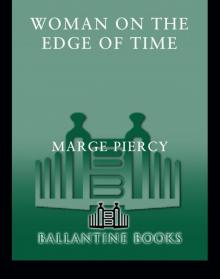 Woman on the Edge of Time
Woman on the Edge of Time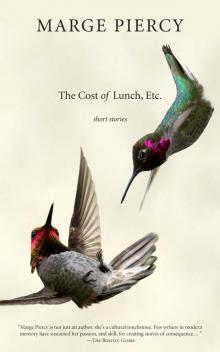 The Cost of Lunch, Etc.: Short Stories
The Cost of Lunch, Etc.: Short Stories Made in Detroit: Poems
Made in Detroit: Poems Sleeping With Cats
Sleeping With Cats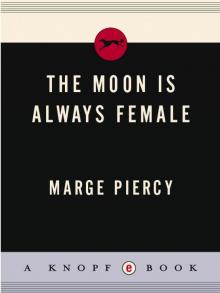 Moon Is Always Female
Moon Is Always Female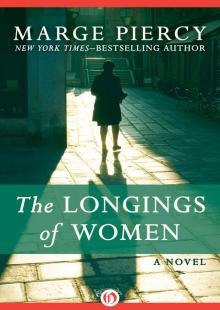 The Longings of Women
The Longings of Women Circles on the Water
Circles on the Water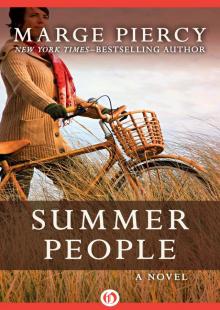 Summer People
Summer People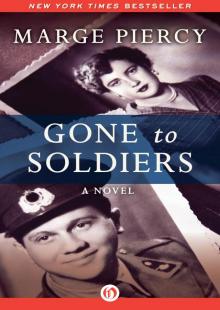 Gone to Soldiers: A Novel
Gone to Soldiers: A Novel The Hunger Moon: New and Selected Poems, 1980-2010
The Hunger Moon: New and Selected Poems, 1980-2010 Vida
Vida Fly Away Home
Fly Away Home He, She and It
He, She and It So You Want to Write
So You Want to Write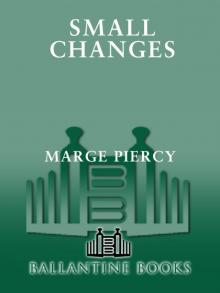 Small Changes
Small Changes Braided Lives
Braided Lives Lord Valentine's Castle
Lord Valentine's Castle Dance the Eagle to Sleep
Dance the Eagle to Sleep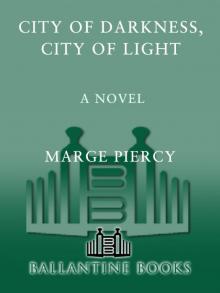 City of Darkness, City of Light
City of Darkness, City of Light The High Cost of Living: A Novel
The High Cost of Living: A Novel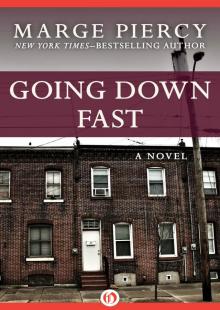 Going Down Fast: A Novel
Going Down Fast: A Novel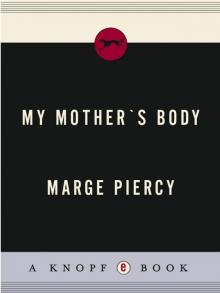 My Mother's Body
My Mother's Body Storm Tide
Storm Tide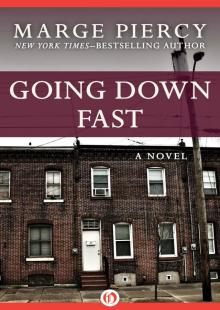 Going Down Fast
Going Down Fast The Third Child
The Third Child The Hunger Moon
The Hunger Moon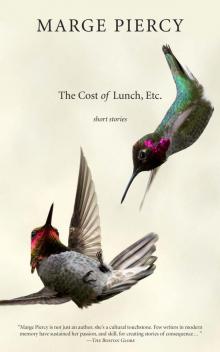 The Cost of Lunch, Etc.
The Cost of Lunch, Etc. Sex Wars
Sex Wars The High Cost of Living
The High Cost of Living Made in Detroit
Made in Detroit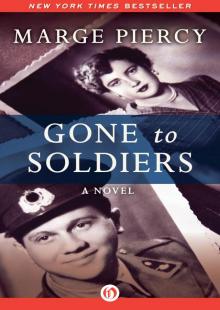 Gone to Soldiers
Gone to Soldiers